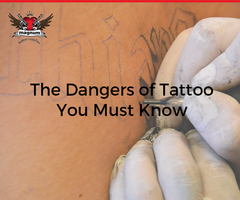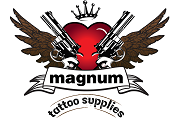The Dangers of Tattoo You must Know

Some people get tattoos to honour their loved ones, their religion, culture or whatever it is that is important to a certain individual. People who have experienced getting a tattoo already know what to look for and what to check when choosing a tattoo artist or selecting a tattoo parlour to do their next tattoo. They ask questions like “Does the artist wear gloves?” and “Do they sterilise equipment before and after using it?” If it's your first time to get a tattoo these are the things you should be looking out for. If you have questions you want to ask, don't be afraid and ask them as long as it will not offend them, and you ask it in a nice way.
However, one question everyone forgets to ask about is “What does the ink contain?” For first times, all the inks might look the same. Some tattoo inks are made of ingredients that can cause allergic reactions. Tattoo Ink manufacturers sometimes don't include these details when they market their products. That's why it's important to research prior to getting a tattoo.
Water is one of the key ingredients in tattoo inks. It is the one responsible for creating the ink product and diluting the ink in parlors. Water is used in diluting the tattoo inks to obtain the specific shade of color a client wants. But, put in mind that any kind of unfiltered water can contaminate the ink and can allow harmful microorganisms to contaminate it, resulting to infectious diseases that may even kill you.
It might not be as popular as it really should, but contamination of tattoo ink products by unfiltered water has become a great problem. These infections will continue to occur until tattoo ink manufacturers and tattoo artists will fully understand the danger it brings to the client’s body. Lucky for those who only need medication for a few weeks or months to get better, but how about those who need to have multiple surgeries and have to go through under the knife just to treat their illness? It will live a scar not only to their skin but also to their lives.
How can clients protect themselves? What are the precautions that a tattoo artist must do to avoid these problems? Here are some of the precautions every tattoo artist must follow. A tattoo artist:
- Must not use products that are not meant for tattooing;
- Must use sterile water if dilution is needed;
- Must not use unsterilised water in washing and rinsing the tattoo equipment.
- Must make use of disease-free techniques in tattooing like maintaining a good hygiene and using clean gloves
In order for customers to avoid the risk of being infected by a disease, they must choose tattoo parlours and tattoo artists that are registered and approved to operate. That way, the customer can be confident that the tattoo artist follows rules and regulations to safe and sanitary tattooing.
- Matthew Nelson






